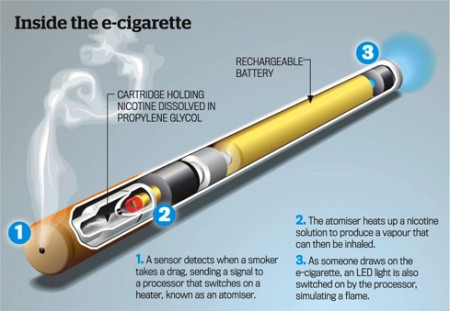It may seem like e-cigarettes have only been on the scene for the past decade or so, but the history of these electronic devices spans almost a century, all the way back to the 1920s. In 1927, a New York-based scientist named Joseph Robinson filed a patent for the first electronic vaporizer, a device intended for use with medicinal compounds. This device exhibited similar characteristics to today’s e-cigs and vaping devices, but the first e-cigarette wouldn’t be suggested until years later. In 1963, Herbert A. Gilbert filed a US patent for the first smokeless cigarette, with the intention of creating a safe alternative to burning paper and tobacco. Unfortunately, Gilbert was living before his time; traditional tobacco cigarettes were still an immensely popular product and it would be another 40 years before his idea would make any real gains.
In the 1990’s, several patents were filed for cigarette substitutes, including a few novel electronic cigarette designs and the Philip Morris “Accord”. However, it wasn’t until the mid-2000s that e-cigarettes became the prototypes of what we know today. The first commercial electronic cigarettes were introduced to the Chinese market in 2004 and by 2006 were widely available in Europe. The success found in European countries led to the introduction of electronic cigarettes in the U.S. in 2007.
Legal Battles
While e-cigarettes and vaping devices continued to rise in popularity, a slew of legal battles ensued. In 2009, California governor Arnold Schwarzenegger rejected a bill seeking to ban e-cigarettes in the state, and in the same year e-commerce giant Amazon banned all sales of electronic tobacco products on their site. That year also saw The United Kingdom Action on Smoking and Health support electronic cigarettes as a harm reduction product, endorsing the development of products which deliver nicotine without harmful tobacco components.
In December 2010, the United States Court of Appeals for the D.C. Circuit ruled that absent therapeutic marketing claims, the FDA could not ban electronic cigarettes as unapproved drug delivery devices, a decision which would become the legal framework for the survival of the e-cigarette and vape industries. The bolstered success of these products was proven when e-cigs were solidified as a billion dollar industry in 2013.
The Hollywood Effect
As vaping devices and e-cigs became a more popular tool for those attempting to quit smoking traditional cigarettes, notable public figures began to show an interest. Actress Katherine Heigl was the first celebrity to openly smoke an e-cig on television, prompting host David Letterman to claim the device was “remarkable”. Hollywood continued to be a friend to the electronic cigarette industry, with SmokeStik International, Inc. harnessing a deal for a product appearance in a film called“Cymbeline”.The visibility continued and in 2015, e-cigs were seen for the first time on HBO in the popular drama “True Detective”.
The Latest Findings
Vape devices and electronic cigarettes are more popular than ever. In 2015, the adult smoking rate dropped from 20.6% in 2009 to 15.2%, with two million regular electronic cigarette users describing themselves as “former smokers.”Public Health England proclaimed in August of this year that e-cigs “have the potential to make a significant contribution to the endgame for tobacco,” and a recent study asserted e-cigarette use is 95% less harmful than traditional tobacco products.
All of this spells great things for e-cig users and the electronic cigarette and vaping industries, and as more studies come to light, the popularity of the electronic cigarette is sure to grow.
Thanks to NJOY for the infographic below.



